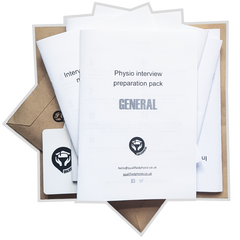by Joe Steel
Whether looking for references to cite in your interview or preparing for your neuro rotation, Joe Steel has compiled for you a list of key references worth having a look at.
NB: This is not an exhaustive list, but it's an excerpt from our Neuro pack where you can find more of Joe's tips as well as a large selection of interview questions and answers (you can grab your copy here).

International and national guidelines
WHO – International Classification of Functioning, Disability and Health (2015)
- Tool created by the WHO to classify diseases and disabilities. Can be used as a clinical reasoning tool and for goal setting purposes.
DoH – National Service Framework for Long Term Conditions (2005)
- Early recognition and prompt diagnosis and treatment
- All patients should have case managers / care coordinators
- Early and specialist rehab including outreach services
- Providing equipment and accommodations
- Community rehabilitation and support
NICE guidelines – Long term rehabilitation after stroke (2013)
- General fitness training is important
- 100% of patients should have contact within 24 hours of discharge from hospital
- Maximum of 6 weeks rehab post discharge for 95% of patients
Royal College of Physicians – Stroke Guidelines (2012)
- Imaging within one hour
- Mobilise within 24 hours of medically stable
- Physio assessment within 72 hours
- 45 mins per day of each therapy
- MDT goals within 5 days NICE guideline
- Early supported discharge has to be of similar level and intensity to stroke unit care
- Primary care service and social care status reviewed 6 weeks after discharge from hospital
Australian Stroke Foundation – Clinical guidelines for Stroke Management: A quick guide for physiotherapy (2010)
- Grades the evidence for physiotherapy treatment and management of stroke patients
- Really concise and useful resource
MS NICE guidelines (2014)
- Consider vestibular rehab for people with MS who have fatigue or mobility problems
KNGF Guidelines for Physical Therapy in patients with Parkinson’s Disease (2004)
- European working group for treatment and management of PD patients
- Grades evidence for specific treatment modalities
Interesting articles
Bang, D.H., Shin, W.S. & Choi, S.J. (2015) ‘The effects of modified constraint-induced movement therapy combined with trunk restraint in subacute stroke: a double-blinded randomized controlled trial’, Clinical Rehabilitation, 29 (6) 561-9
Comments: Interesting research paper looking at the effect of combining trunk restraint with mCIMT. Well carried out study in Korea, well matched groups but small number of participants. Additional trunk restraint significantly improved ARAT, Fugyl-Meyer & Maximal elbow extension scores. So watch out for compensatory trunk movements when doing your upper limb rehab!
Carter A, Daley A, Humphreys L, Snowdon N, Woodroofe N, Petty J, Roalfe A, Tosh J, Sharrack B, Saxton J. (2014) ‘Pragmatic intervention for increasing self-directed exercise behaviour and improving important health outcomes in people with multiple sclerosis: a randomised controlled trial.’ Multiple Sclerosis.
Comments: A large trial which followed patients up over 9 months to see if a more intense initial period of physio supervised exercise, goal setting, education and CBT was better than a usual care model of less frequent face to face intervention. The enhanced group reported much better QoL outcomes and fatigue outcomes, even at the lengthy follow up. Further research paper after this showed it was a cost effective intervention as well. Shows the importance of appropriately tailored exercise programs, but more importantly the role of CBT and education to get patients to self manage and make lasting changes for a more active lifestyle
Troche et al. (2010) ‘Aspiration and swallowing in Parkinson disease and rehabilitation with EMST: a randomized trial’. Neurology.
Comments: Another excellent piece of research from a well respected journal. Using a very inexpensive piece of equipment (expiratory muscle trainer) with an easily administered protocol (5 days per week, 20 mins for total of 4 weeks). Produced improved penetration aspiration scores (using video fluoroscopy) compared to control groups. Therefore improving dysphagia and decreasing risk of aspiration pneumonia. Proposed mechanism is improved hyolaryngeal complex movement.
Could well have positive implications for other neurological populations at risk of dysphagia and aspiration pneumonia.
Pandlan et al. (2014) ‘Mirror Therapy in Unilateral Neglect After Stroke (MUST trial)’ Neurology.
Comments: Another paper from Neurology, robust methodology: random allocation, blinded subjects & intention to treat. Looking at Thalamic & Parietal strokes with unilateral neglect. Actual vs sham mirror box therapy and followed up over 6 month period. MT group had statistically significant improvement in picture identification and line bisection (series of horizontal lines – need to bisect the middle). Providing further evidence for the use of mirror therapy as treatment for hemisensory and spatial neglect.
Books worth knowing about
Ida Bromley – Tetraplegia & Paraplegia: A guide for physiotherapists
Pryor & Prasad – Physiotherapy for Respiratory and Cardiac Problems: Adults and Paediatrics
Susan Edwards – Neurological Physiotherapy
Shumway-Cook & Woollacott – Motor Control, translating research into clinical practice
Michael Barnes & Garth Johnson – UMN Syndrome & Spasticity
We hope this helps you in your preparation! Again this is not an exhaustive list, only an excerpt of our Neuro pack. If you have references and books you use or find useful, don't hesitate to share them in the comments below!
____________________
Related products
Neuro interview preparation pack
Our Neuro pack designed for newly-graduated physios or physios applying for band 5 / junior positions includes interview questions and answers, key articles and references and top tips for the job, amongst others.
6 interview preparation packs, for less.
____________________
About the author

Joe Steel
Joe is a physiotherapist based at the London Spinal Cord Injury Centre in Stanmore. Joe’s primary interest is in complex neurological rehabilitation, and he has worked in a wide range of settings with neurological patients accross London. He is actively involved in research, currently looking at spasticity management modalities within the spinal cord injured population. Joe runs our Neuro seminar and has contributed to the writing of our Neuro interview pack.


